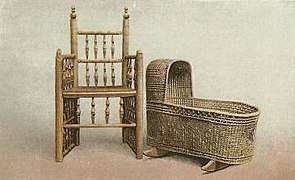Brewster Chair
A Brewster Chair is a style of turned chair made in mid-17th-century ("Pilgrim Century") New England, United States.

A 17th-century Brewster Chair[1]
Origin
The "Brewster Chair" was named after Willam Brewster, one of the Pilgrim fathers who landed in Plymouth, Massachusetts in 1620. In 1830 the Brewster family of Duxbury donated Elder Brewster's original chair to Pilgrim Hall Museum in Plymouth, where it remains today. His chair was created in New England between 1630 and 1660 of American white ash. Other similar New England chairs from the 17th century have been named after this piece.[2]
In the 1970s, Rhode Island sculptor Armand LaMontagne produced a notorious fake Brewster Chair that fooled the national experts at the Henry Ford Museum, which acquired the piece.[2][3]
Gallery
 The Pilgrim Hall Museum owns the original Elder Brewster Chair and Peregrine White cradle.
The Pilgrim Hall Museum owns the original Elder Brewster Chair and Peregrine White cradle.
gollark: Actually, I think they would need to somehow directly induce quaila by neural interface.
gollark: Neither does slightly differently shaped images.
gollark: That standard means that adjusting monitor settings, screen readers or thing 3 are modification.
gollark: Too bad for them, they aren't directly piping photons into my face.
gollark: I mean why is it modifying the site.
References
- Nutting, W. (1921). Furniture of the Pilgrim Century: 1620-1720, Including Colonial Utensils and Hardware. Marshall Jones Company. p. 182. Retrieved 2019-08-26.
- Nutting, Wallace (1921-01-01). Furniture of the Pilgrim Century: 1620-1720, Including Colonial Utensils and Hardware. Marshall Jones Company.
- "The Brewster Chair and the game of "Fool The Experts"". Henry Ford Museum. April 1, 2000. Archived from the original on 5 August 2010. Retrieved 20 October 2010.
External links
This article is issued from Wikipedia. The text is licensed under Creative Commons - Attribution - Sharealike. Additional terms may apply for the media files.